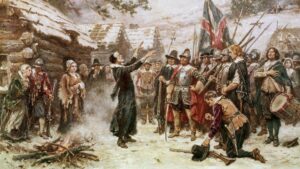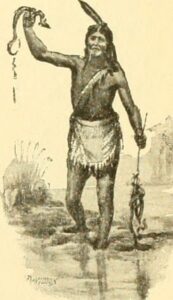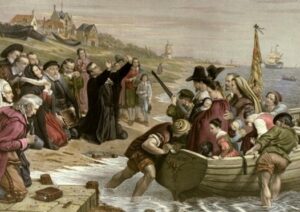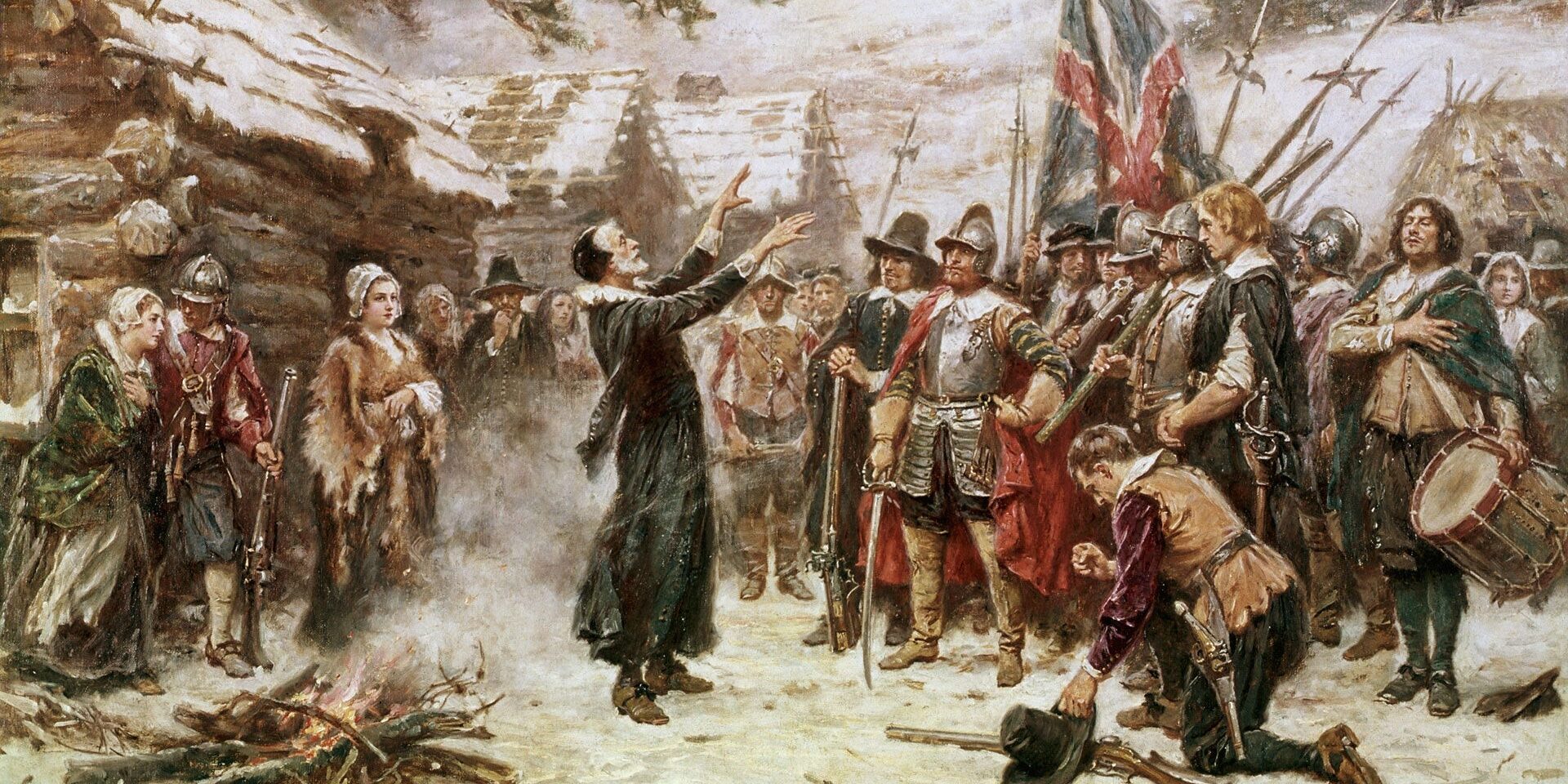 The Pilgrims and the Puritans celebrated two types of prayer services: fasting (and humiliation), as well as thanksgiving. As I wrote in my book, Journey of Faith:
The Pilgrims and the Puritans celebrated two types of prayer services: fasting (and humiliation), as well as thanksgiving. As I wrote in my book, Journey of Faith:
“To the Pilgrim, as well as the Puritan, everything was religious, but a prayer and fast day was called in the spring (regularly by 1694), to confess sin and ask God for a productive year. Then, in the fall, a Thanksgiving day was called to rehearse answered prayer. Neither of these were the singular root of the harvest festival of the Pilgrims (in 1621).”
Civil or religious leaders could call either type of service spontaneously, as they did in 1623 due to the multi-week drought. Edward Winslow reported it this way:
 “But Oh the mercy of our God! Who was as ready to hear, as we to ask; for though in the morning, when we assembled together, the heavens were as clear, and the drought as like to continue as ever it was, yet, (our exercise continuing some eight or nine hours,) before our departure, the weather was overcast, the clouds gathered together on all sides, and on the next morning distilled such soft, sweet, and moderate showers of rain, continuing some fourteen days, and mixed with such seasonable weather, as it was hard to say whether our withered corn or drooping affections were most quickened or revived; such was the bounty and goodness of our God.”
“But Oh the mercy of our God! Who was as ready to hear, as we to ask; for though in the morning, when we assembled together, the heavens were as clear, and the drought as like to continue as ever it was, yet, (our exercise continuing some eight or nine hours,) before our departure, the weather was overcast, the clouds gathered together on all sides, and on the next morning distilled such soft, sweet, and moderate showers of rain, continuing some fourteen days, and mixed with such seasonable weather, as it was hard to say whether our withered corn or drooping affections were most quickened or revived; such was the bounty and goodness of our God.”
 Winslow went on to write:
Winslow went on to write:
“Of this the Indians, by means of Hobbamock, took notice; who being then in the town, and this exercise in the midst of the week, said, It was but three days since Sunday; and therefore demanded of a boy, what was the reason thereof. Which when he knew, and saw what effects followed thereupon, he and all of them admired the goodness of our God towards us, that wrought so great a change in so short a time; showing the difference between their conjuration, and our invocation on the name of God for rain; theirs being mixed with such storms and tempests, as sometimes, instead of doing them good, it layeth the corn flat on the ground, to their prejudice; but ours in so gentle and seasonable a manner, as they never observed the like.”
Nathaniel Morton reported that Hobamock had said, “’Now I see that the Englishman’s God is a good God, for he hath heard you, and sent you rain, and that without storms and tempests and thunder, which usually we have with our rain, which breaks down our corn, but yours stands whole and good still; surely your God is a good God;’ or with words to the like effect.”
In a footnote provided for the reprint of Good News from New England, the following is given:
“In New England’s First Fruits, published in London in 1643, he (Hobbamock) is described as follows: ‘As he increased in knowledge, so in affection, and also in his practice, reforming and conforming himself accordingly; and though he was much tempted by enticements, scoffs, and scorns from the Indians, yet could he never be gotten from the English, nor from seeking after their God, but died amongst them, leaving some good hopes in their hearts that his soul went to rest.’”
In addition to the answered prayer of rain, as well as the apparent conversion of Hobbamock, their interpreter (remember Squanto had died in 1622), Captain Standish was able to secure supplies, and the Pilgrims received word that more help may come from England. Winslow wrote,
“So that having these many signs of God’s favor and acceptation, we thought it would be great ingratitude, if secretly we should smother up the same, or content ourselves with private thanksgiving for that, which by private prayer could not be obtained. And therefore another solemn day was set apart and appointed for that end; wherein we returned glory, honor, and praise, with all thankfulness, to our good God, which dealt so graciously with us; whose name for these and all other his mercies towards his church, and chosen ones, by them be blessed and praised, now and evermore. Amen.”
This “day of thanksgiving” Morison wrote about in a footnote in Bradford’s journal:
“Love in Fast and Thanksgiving Days of New England, pp. 84-5 argues that this Thanksgiving Day was celebrated 30 July 1623, the day before the Anne arrived. The Pilgrims never had a regular fall Thanksgiving Day. A law of 15 Nov. 1636 (Plymouth Colony Records XI 18) allows the Governor and Assistants ‘to command solemn days of humiliation by fasting, etc., and also for thanksgiving as occasion shall be offered.’”
So what kind of thanksgiving service might the Pilgrims have had in late July of 1623? First, it probably lasted as long as the day of humiliation, fasting, and prayer – a full day. Second, those that spoke may have rehearsed the theological teachings of their pastor, John Robinson, who spoke of humility as a balance between the two extremes of “undervaluing God’s goodness” or a “humble hypocrisy… reverencing… vices” that was the true biblical basis for thanksgiving or gratefulness.
All this to say that true humility “is that virtue by which we are taught to value according to, and not above the worth, ourselves, and all the good things, which God hath given us.” Pastor Robinson taught that true humility was only to be found in Christ:
 “Yet as Christ Jesus ceased not to be God, though he humbled himself to the taking upon him the form of a servant, Phil. 2:7; so neither is any man either in truth, or account of God, or good men, the less, but much the more excellent for his lowly appearance to himself or others. Yea, as the same Christ our Lord stepped from the shameful cross to the height of his glory, and exaltation; so he that will make any high building in Christianity, must first think of, and lay this low foundation of humility.”
“Yet as Christ Jesus ceased not to be God, though he humbled himself to the taking upon him the form of a servant, Phil. 2:7; so neither is any man either in truth, or account of God, or good men, the less, but much the more excellent for his lowly appearance to himself or others. Yea, as the same Christ our Lord stepped from the shameful cross to the height of his glory, and exaltation; so he that will make any high building in Christianity, must first think of, and lay this low foundation of humility.”
Let us be truly humble and thus grateful. Let us not reduce God’s goodness due to our pride about what we can accomplish on our own, nor be ashamed to embrace His love in Christ due to self-pity, but instead, “…let the peace of God rule in your hearts, to which also you were called in one body; and be thankful” (Colossians 3:15).







